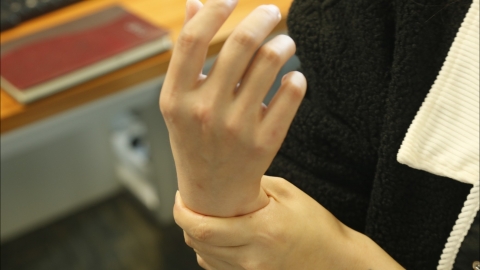What are the common causes of numbness in the hands and feet?
Generally, common causes of numbness in the hands and feet may include poor posture, transient hypoxia, peripheral neuropathy, multiple sclerosis, lumbar disc herniation, and other conditions. Symptomatic management may involve general treatment, medication, and other approaches. If discomfort occurs, it is recommended to seek medical attention promptly and undergo appropriate treatment under a doctor's guidance. A detailed analysis is as follows:

1. Poor Posture
Maintaining the same posture for an extended period, such as sitting or standing for long durations, may prevent nerve signals from being transmitted normally to the extremities, resulting in a sensation of numbness. This condition typically subsides gradually after changing posture. It is advisable to change postures regularly and perform appropriate stretching exercises, such as moving the fingers and toes, to promote blood circulation and aid in nerve function recovery.
2. Transient Hypoxia
During hypoxia, the brain reduces blood flow to the limbs to ensure oxygen supply to vital organs, leading to weakened nerve function in localized areas and causing numbness. Symptoms may also include headache and difficulty breathing. When hypoxia occurs, immediate rest is necessary, and supplemental oxygen should be administered when required. Maintaining deep and slow breathing while avoiding shallow and rapid breaths is also recommended.
3. Peripheral Neuropathy
This condition can be triggered by viral infections, nerve injuries, or other factors. Damage to or dysfunction of the peripheral nerves can impair nerve conduction, leading to abnormal sensations such as numbness in the hands and feet. Under a doctor's recommendation, patients may take nerve-nourishing medications such as mecobalamin capsules, vitamin B1 tablets, and vitamin B12 tablets to alleviate discomfort.
4. Multiple Sclerosis
In multiple sclerosis, the immune system attacks the myelin sheath surrounding nerves, disrupting nerve signal transmission and potentially causing sensory disturbances, limb numbness, blurred vision, balance disorders, and other symptoms. It is recommended to follow medical advice for treatment with medications such as glatiramer acetate injection, dimethyl fumarate enteric-coated capsules, and teriflunomide tablets.
5. Lumbar Disc Herniation
This condition may result from chronic strain, trauma, or other factors. The herniated lumbar disc compresses the nerve roots, affecting nerve conduction. Some patients may experience symptoms such as numbness in the hands and feet and lower back pain. Patients may take medications such as Gentongping Granules, Yaotongning Capsules, and Duhuo Jisheng Pills as directed by a physician to relieve symptoms.
It is also recommended to engage in moderate exercise regularly, performing aerobic activities such as jogging or swimming 3–4 times per week to enhance blood circulation.







